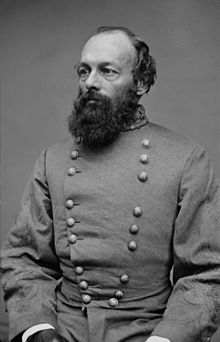E. Kirby Smith
|
General Edmund Kirby Smith |
|
|---|---|

Portrait of General Kirby Smith
|
|
| Nickname(s) | Ted, Seminole |
| Born |
May 16, 1824 St. Augustine, Florida |
| Died | March 28, 1893 (aged 68) Sewanee, Tennessee |
| Place of burial | University Cemetery Sewanee, Tennessee |
| Allegiance |
|
| Service/branch |
|
| Years of service | 1845–61 (USA) 1861–65 (CSA) |
| Rank |
|
| Commands held |
Third Corps, Army of Tennessee Trans-Mississippi Department |
| Battles/wars |
Mexican–American War American Civil War |
| Signature | |
Edmund Kirby Smith (May 16, 1824 – March 28, 1893) was a career United States Army officer who served with the Confederates during the Civil War, as one of only seven officers to reach the rank of Full General.
Smith was wounded at First Bull Run and distinguished himself during the Heartland Offensive, the Confederacy's unsuccessful attempt to capture Kentucky in 1862, before being made commander of the Trans-Mississippi Department in January 1863. The area included most actions east of the Rocky Mountains and west of the Mississippi River. In 1863, Smith dispatched troops in an unsuccessful attempt to relieve the Siege of Vicksburg. After Vicksburg was captured in July, the isolated Trans-Mississippi zone was cut off from the rest of the Confederacy, and became virtually an independent nation, nicknamed 'Kirby Smithdom'. In the Red River Campaign of Spring 1864, he commanded victorious Confederate troops under General Richard Taylor, who defeated a combined Union army/navy assault under Nathaniel P. Banks.
On May 26, 1865, he surrendered his army at Galveston, Texas, before fleeing abroad to avoid arrest for treason. His wife negotiated his return. After the war, Smith worked in the telegraph and railway industries, as well as serving as a college professor.
Smith was born in 1824 in St. Augustine, Florida, as the youngest child to Joseph Lee Smith and Frances Kirby Smith. Both his parents were natives of Litchfield, Connecticut, where their older children were born. The family moved to Florida in 1821, shortly before the elder Smith was named a Superior Court judge in the new Florida Territory, acquired by the US from Spain. Older siblings included Ephraim, born in 1807; sister Frances, born in 1809; and Josephine, who died in 1835, likely of tuberculosis. In 1836, his parents sent him to a military boarding school in Virginia, which he attended until his enrollment in the United States Military Academy at West Point, New York.
...
Wikipedia
